Entrepreneurship: Small Business Management, Economic Impact & Traits
VerifiedAdded on 2020/09/03
|18
|6560
|35
Report
AI Summary
This report provides a comprehensive overview of entrepreneurship and small business management, examining various entrepreneurial ventures and their typology. It highlights the similarities and differences between these ventures, focusing on their size, nature, and market share. The report analyzes the impact of micro and small businesses on the UK economy, particularly during recession periods, emphasizing their role in generating income and employment. It further explores the traits and characteristics of successful entrepreneurs and assesses how their personality reflects on their motivation and mindset. The report also considers how background and experience can both aid and hinder entrepreneurship. Desklib offers a platform to access this and similar solved assignments for students.

Entrepreneurship and
Small Business
Management
Small Business
Management
Paraphrase This Document
Need a fresh take? Get an instant paraphrase of this document with our AI Paraphraser
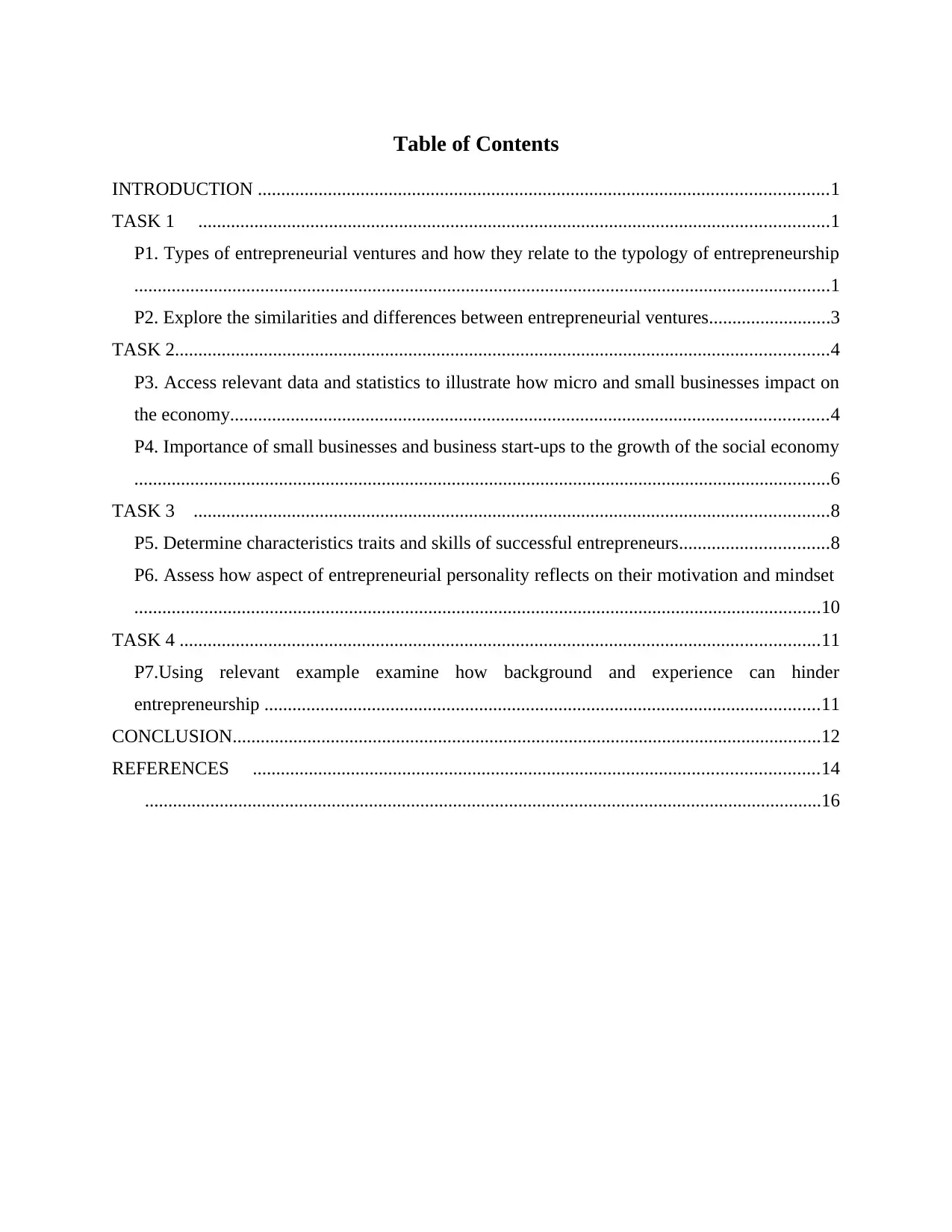
Table of Contents
INTRODUCTION ..........................................................................................................................1
TASK 1 .......................................................................................................................................1
P1. Types of entrepreneurial ventures and how they relate to the typology of entrepreneurship
.....................................................................................................................................................1
P2. Explore the similarities and differences between entrepreneurial ventures..........................3
TASK 2............................................................................................................................................4
P3. Access relevant data and statistics to illustrate how micro and small businesses impact on
the economy................................................................................................................................4
P4. Importance of small businesses and business start-ups to the growth of the social economy
.....................................................................................................................................................6
TASK 3 ........................................................................................................................................8
P5. Determine characteristics traits and skills of successful entrepreneurs................................8
P6. Assess how aspect of entrepreneurial personality reflects on their motivation and mindset
...................................................................................................................................................10
TASK 4 .........................................................................................................................................11
P7.Using relevant example examine how background and experience can hinder
entrepreneurship .......................................................................................................................11
CONCLUSION..............................................................................................................................12
REFERENCES .........................................................................................................................14
.................................................................................................................................................16
INTRODUCTION ..........................................................................................................................1
TASK 1 .......................................................................................................................................1
P1. Types of entrepreneurial ventures and how they relate to the typology of entrepreneurship
.....................................................................................................................................................1
P2. Explore the similarities and differences between entrepreneurial ventures..........................3
TASK 2............................................................................................................................................4
P3. Access relevant data and statistics to illustrate how micro and small businesses impact on
the economy................................................................................................................................4
P4. Importance of small businesses and business start-ups to the growth of the social economy
.....................................................................................................................................................6
TASK 3 ........................................................................................................................................8
P5. Determine characteristics traits and skills of successful entrepreneurs................................8
P6. Assess how aspect of entrepreneurial personality reflects on their motivation and mindset
...................................................................................................................................................10
TASK 4 .........................................................................................................................................11
P7.Using relevant example examine how background and experience can hinder
entrepreneurship .......................................................................................................................11
CONCLUSION..............................................................................................................................12
REFERENCES .........................................................................................................................14
.................................................................................................................................................16

⊘ This is a preview!⊘
Do you want full access?
Subscribe today to unlock all pages.

Trusted by 1+ million students worldwide
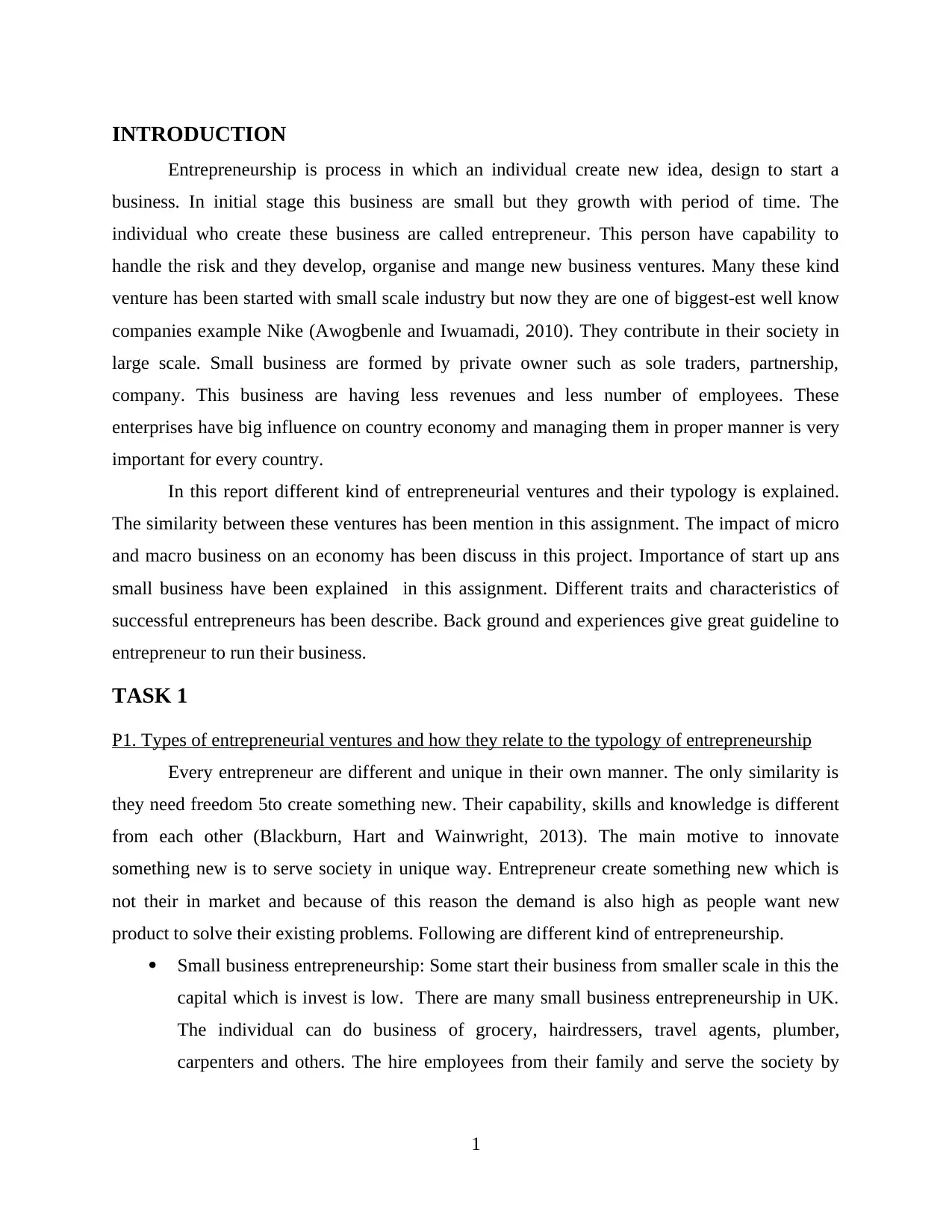
INTRODUCTION
Entrepreneurship is process in which an individual create new idea, design to start a
business. In initial stage this business are small but they growth with period of time. The
individual who create these business are called entrepreneur. This person have capability to
handle the risk and they develop, organise and mange new business ventures. Many these kind
venture has been started with small scale industry but now they are one of biggest-est well know
companies example Nike (Awogbenle and Iwuamadi, 2010). They contribute in their society in
large scale. Small business are formed by private owner such as sole traders, partnership,
company. This business are having less revenues and less number of employees. These
enterprises have big influence on country economy and managing them in proper manner is very
important for every country.
In this report different kind of entrepreneurial ventures and their typology is explained.
The similarity between these ventures has been mention in this assignment. The impact of micro
and macro business on an economy has been discuss in this project. Importance of start up ans
small business have been explained in this assignment. Different traits and characteristics of
successful entrepreneurs has been describe. Back ground and experiences give great guideline to
entrepreneur to run their business.
TASK 1
P1. Types of entrepreneurial ventures and how they relate to the typology of entrepreneurship
Every entrepreneur are different and unique in their own manner. The only similarity is
they need freedom 5to create something new. Their capability, skills and knowledge is different
from each other (Blackburn, Hart and Wainwright, 2013). The main motive to innovate
something new is to serve society in unique way. Entrepreneur create something new which is
not their in market and because of this reason the demand is also high as people want new
product to solve their existing problems. Following are different kind of entrepreneurship.
Small business entrepreneurship: Some start their business from smaller scale in this the
capital which is invest is low. There are many small business entrepreneurship in UK.
The individual can do business of grocery, hairdressers, travel agents, plumber,
carpenters and others. The hire employees from their family and serve the society by
1
Entrepreneurship is process in which an individual create new idea, design to start a
business. In initial stage this business are small but they growth with period of time. The
individual who create these business are called entrepreneur. This person have capability to
handle the risk and they develop, organise and mange new business ventures. Many these kind
venture has been started with small scale industry but now they are one of biggest-est well know
companies example Nike (Awogbenle and Iwuamadi, 2010). They contribute in their society in
large scale. Small business are formed by private owner such as sole traders, partnership,
company. This business are having less revenues and less number of employees. These
enterprises have big influence on country economy and managing them in proper manner is very
important for every country.
In this report different kind of entrepreneurial ventures and their typology is explained.
The similarity between these ventures has been mention in this assignment. The impact of micro
and macro business on an economy has been discuss in this project. Importance of start up ans
small business have been explained in this assignment. Different traits and characteristics of
successful entrepreneurs has been describe. Back ground and experiences give great guideline to
entrepreneur to run their business.
TASK 1
P1. Types of entrepreneurial ventures and how they relate to the typology of entrepreneurship
Every entrepreneur are different and unique in their own manner. The only similarity is
they need freedom 5to create something new. Their capability, skills and knowledge is different
from each other (Blackburn, Hart and Wainwright, 2013). The main motive to innovate
something new is to serve society in unique way. Entrepreneur create something new which is
not their in market and because of this reason the demand is also high as people want new
product to solve their existing problems. Following are different kind of entrepreneurship.
Small business entrepreneurship: Some start their business from smaller scale in this the
capital which is invest is low. There are many small business entrepreneurship in UK.
The individual can do business of grocery, hairdressers, travel agents, plumber,
carpenters and others. The hire employees from their family and serve the society by
1
Paraphrase This Document
Need a fresh take? Get an instant paraphrase of this document with our AI Paraphraser
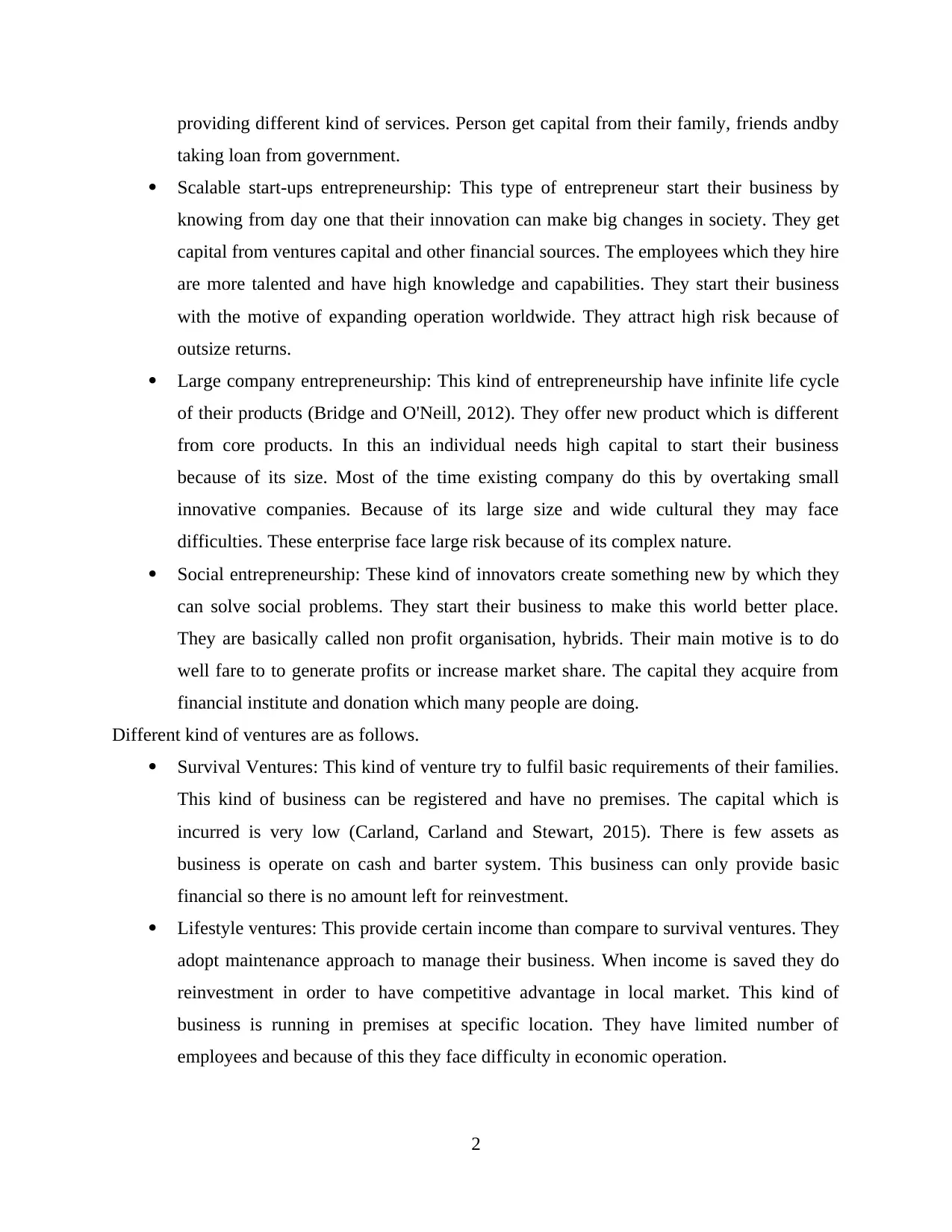
providing different kind of services. Person get capital from their family, friends andby
taking loan from government.
Scalable start-ups entrepreneurship: This type of entrepreneur start their business by
knowing from day one that their innovation can make big changes in society. They get
capital from ventures capital and other financial sources. The employees which they hire
are more talented and have high knowledge and capabilities. They start their business
with the motive of expanding operation worldwide. They attract high risk because of
outsize returns.
Large company entrepreneurship: This kind of entrepreneurship have infinite life cycle
of their products (Bridge and O'Neill, 2012). They offer new product which is different
from core products. In this an individual needs high capital to start their business
because of its size. Most of the time existing company do this by overtaking small
innovative companies. Because of its large size and wide cultural they may face
difficulties. These enterprise face large risk because of its complex nature.
Social entrepreneurship: These kind of innovators create something new by which they
can solve social problems. They start their business to make this world better place.
They are basically called non profit organisation, hybrids. Their main motive is to do
well fare to to generate profits or increase market share. The capital they acquire from
financial institute and donation which many people are doing.
Different kind of ventures are as follows.
Survival Ventures: This kind of venture try to fulfil basic requirements of their families.
This kind of business can be registered and have no premises. The capital which is
incurred is very low (Carland, Carland and Stewart, 2015). There is few assets as
business is operate on cash and barter system. This business can only provide basic
financial so there is no amount left for reinvestment.
Lifestyle ventures: This provide certain income than compare to survival ventures. They
adopt maintenance approach to manage their business. When income is saved they do
reinvestment in order to have competitive advantage in local market. This kind of
business is running in premises at specific location. They have limited number of
employees and because of this they face difficulty in economic operation.
2
taking loan from government.
Scalable start-ups entrepreneurship: This type of entrepreneur start their business by
knowing from day one that their innovation can make big changes in society. They get
capital from ventures capital and other financial sources. The employees which they hire
are more talented and have high knowledge and capabilities. They start their business
with the motive of expanding operation worldwide. They attract high risk because of
outsize returns.
Large company entrepreneurship: This kind of entrepreneurship have infinite life cycle
of their products (Bridge and O'Neill, 2012). They offer new product which is different
from core products. In this an individual needs high capital to start their business
because of its size. Most of the time existing company do this by overtaking small
innovative companies. Because of its large size and wide cultural they may face
difficulties. These enterprise face large risk because of its complex nature.
Social entrepreneurship: These kind of innovators create something new by which they
can solve social problems. They start their business to make this world better place.
They are basically called non profit organisation, hybrids. Their main motive is to do
well fare to to generate profits or increase market share. The capital they acquire from
financial institute and donation which many people are doing.
Different kind of ventures are as follows.
Survival Ventures: This kind of venture try to fulfil basic requirements of their families.
This kind of business can be registered and have no premises. The capital which is
incurred is very low (Carland, Carland and Stewart, 2015). There is few assets as
business is operate on cash and barter system. This business can only provide basic
financial so there is no amount left for reinvestment.
Lifestyle ventures: This provide certain income than compare to survival ventures. They
adopt maintenance approach to manage their business. When income is saved they do
reinvestment in order to have competitive advantage in local market. This kind of
business is running in premises at specific location. They have limited number of
employees and because of this they face difficulty in economic operation.
2
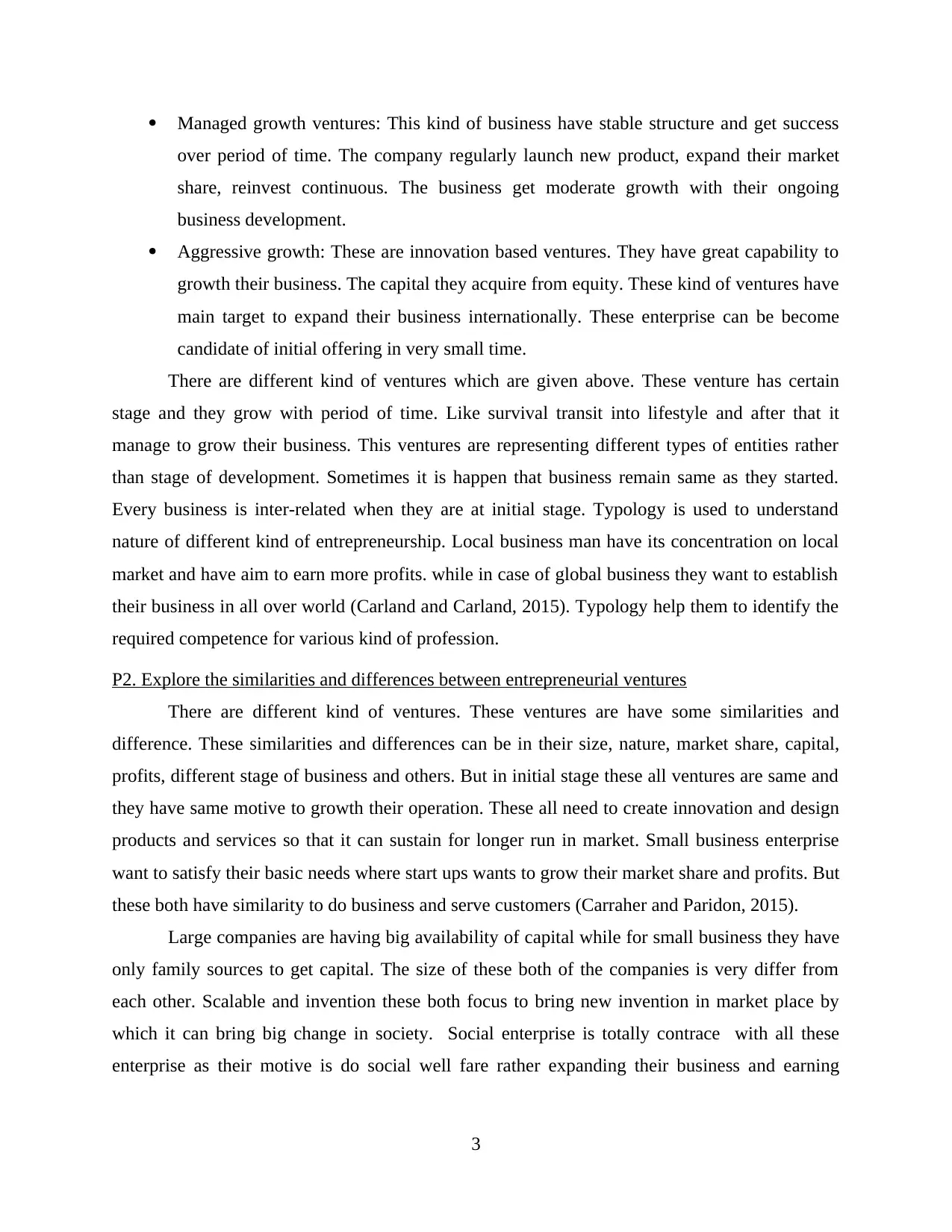
Managed growth ventures: This kind of business have stable structure and get success
over period of time. The company regularly launch new product, expand their market
share, reinvest continuous. The business get moderate growth with their ongoing
business development.
Aggressive growth: These are innovation based ventures. They have great capability to
growth their business. The capital they acquire from equity. These kind of ventures have
main target to expand their business internationally. These enterprise can be become
candidate of initial offering in very small time.
There are different kind of ventures which are given above. These venture has certain
stage and they grow with period of time. Like survival transit into lifestyle and after that it
manage to grow their business. This ventures are representing different types of entities rather
than stage of development. Sometimes it is happen that business remain same as they started.
Every business is inter-related when they are at initial stage. Typology is used to understand
nature of different kind of entrepreneurship. Local business man have its concentration on local
market and have aim to earn more profits. while in case of global business they want to establish
their business in all over world (Carland and Carland, 2015). Typology help them to identify the
required competence for various kind of profession.
P2. Explore the similarities and differences between entrepreneurial ventures
There are different kind of ventures. These ventures are have some similarities and
difference. These similarities and differences can be in their size, nature, market share, capital,
profits, different stage of business and others. But in initial stage these all ventures are same and
they have same motive to growth their operation. These all need to create innovation and design
products and services so that it can sustain for longer run in market. Small business enterprise
want to satisfy their basic needs where start ups wants to grow their market share and profits. But
these both have similarity to do business and serve customers (Carraher and Paridon, 2015).
Large companies are having big availability of capital while for small business they have
only family sources to get capital. The size of these both of the companies is very differ from
each other. Scalable and invention these both focus to bring new invention in market place by
which it can bring big change in society. Social enterprise is totally contrace with all these
enterprise as their motive is do social well fare rather expanding their business and earning
3
over period of time. The company regularly launch new product, expand their market
share, reinvest continuous. The business get moderate growth with their ongoing
business development.
Aggressive growth: These are innovation based ventures. They have great capability to
growth their business. The capital they acquire from equity. These kind of ventures have
main target to expand their business internationally. These enterprise can be become
candidate of initial offering in very small time.
There are different kind of ventures which are given above. These venture has certain
stage and they grow with period of time. Like survival transit into lifestyle and after that it
manage to grow their business. This ventures are representing different types of entities rather
than stage of development. Sometimes it is happen that business remain same as they started.
Every business is inter-related when they are at initial stage. Typology is used to understand
nature of different kind of entrepreneurship. Local business man have its concentration on local
market and have aim to earn more profits. while in case of global business they want to establish
their business in all over world (Carland and Carland, 2015). Typology help them to identify the
required competence for various kind of profession.
P2. Explore the similarities and differences between entrepreneurial ventures
There are different kind of ventures. These ventures are have some similarities and
difference. These similarities and differences can be in their size, nature, market share, capital,
profits, different stage of business and others. But in initial stage these all ventures are same and
they have same motive to growth their operation. These all need to create innovation and design
products and services so that it can sustain for longer run in market. Small business enterprise
want to satisfy their basic needs where start ups wants to grow their market share and profits. But
these both have similarity to do business and serve customers (Carraher and Paridon, 2015).
Large companies are having big availability of capital while for small business they have
only family sources to get capital. The size of these both of the companies is very differ from
each other. Scalable and invention these both focus to bring new invention in market place by
which it can bring big change in society. Social enterprise is totally contrace with all these
enterprise as their motive is do social well fare rather expanding their business and earning
3
⊘ This is a preview!⊘
Do you want full access?
Subscribe today to unlock all pages.

Trusted by 1+ million students worldwide
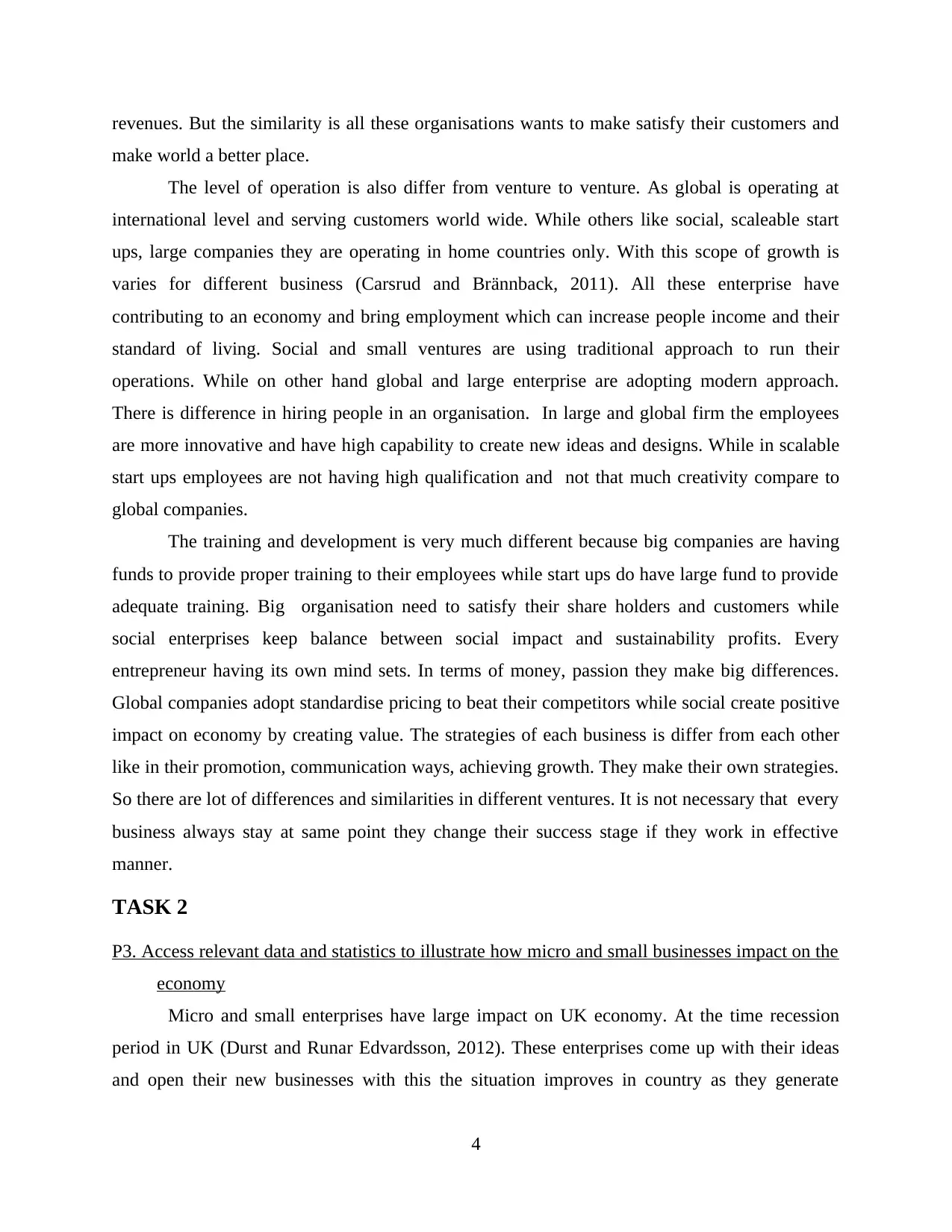
revenues. But the similarity is all these organisations wants to make satisfy their customers and
make world a better place.
The level of operation is also differ from venture to venture. As global is operating at
international level and serving customers world wide. While others like social, scaleable start
ups, large companies they are operating in home countries only. With this scope of growth is
varies for different business (Carsrud and Brännback, 2011). All these enterprise have
contributing to an economy and bring employment which can increase people income and their
standard of living. Social and small ventures are using traditional approach to run their
operations. While on other hand global and large enterprise are adopting modern approach.
There is difference in hiring people in an organisation. In large and global firm the employees
are more innovative and have high capability to create new ideas and designs. While in scalable
start ups employees are not having high qualification and not that much creativity compare to
global companies.
The training and development is very much different because big companies are having
funds to provide proper training to their employees while start ups do have large fund to provide
adequate training. Big organisation need to satisfy their share holders and customers while
social enterprises keep balance between social impact and sustainability profits. Every
entrepreneur having its own mind sets. In terms of money, passion they make big differences.
Global companies adopt standardise pricing to beat their competitors while social create positive
impact on economy by creating value. The strategies of each business is differ from each other
like in their promotion, communication ways, achieving growth. They make their own strategies.
So there are lot of differences and similarities in different ventures. It is not necessary that every
business always stay at same point they change their success stage if they work in effective
manner.
TASK 2
P3. Access relevant data and statistics to illustrate how micro and small businesses impact on the
economy
Micro and small enterprises have large impact on UK economy. At the time recession
period in UK (Durst and Runar Edvardsson, 2012). These enterprises come up with their ideas
and open their new businesses with this the situation improves in country as they generate
4
make world a better place.
The level of operation is also differ from venture to venture. As global is operating at
international level and serving customers world wide. While others like social, scaleable start
ups, large companies they are operating in home countries only. With this scope of growth is
varies for different business (Carsrud and Brännback, 2011). All these enterprise have
contributing to an economy and bring employment which can increase people income and their
standard of living. Social and small ventures are using traditional approach to run their
operations. While on other hand global and large enterprise are adopting modern approach.
There is difference in hiring people in an organisation. In large and global firm the employees
are more innovative and have high capability to create new ideas and designs. While in scalable
start ups employees are not having high qualification and not that much creativity compare to
global companies.
The training and development is very much different because big companies are having
funds to provide proper training to their employees while start ups do have large fund to provide
adequate training. Big organisation need to satisfy their share holders and customers while
social enterprises keep balance between social impact and sustainability profits. Every
entrepreneur having its own mind sets. In terms of money, passion they make big differences.
Global companies adopt standardise pricing to beat their competitors while social create positive
impact on economy by creating value. The strategies of each business is differ from each other
like in their promotion, communication ways, achieving growth. They make their own strategies.
So there are lot of differences and similarities in different ventures. It is not necessary that every
business always stay at same point they change their success stage if they work in effective
manner.
TASK 2
P3. Access relevant data and statistics to illustrate how micro and small businesses impact on the
economy
Micro and small enterprises have large impact on UK economy. At the time recession
period in UK (Durst and Runar Edvardsson, 2012). These enterprises come up with their ideas
and open their new businesses with this the situation improves in country as they generate
4
Paraphrase This Document
Need a fresh take? Get an instant paraphrase of this document with our AI Paraphraser
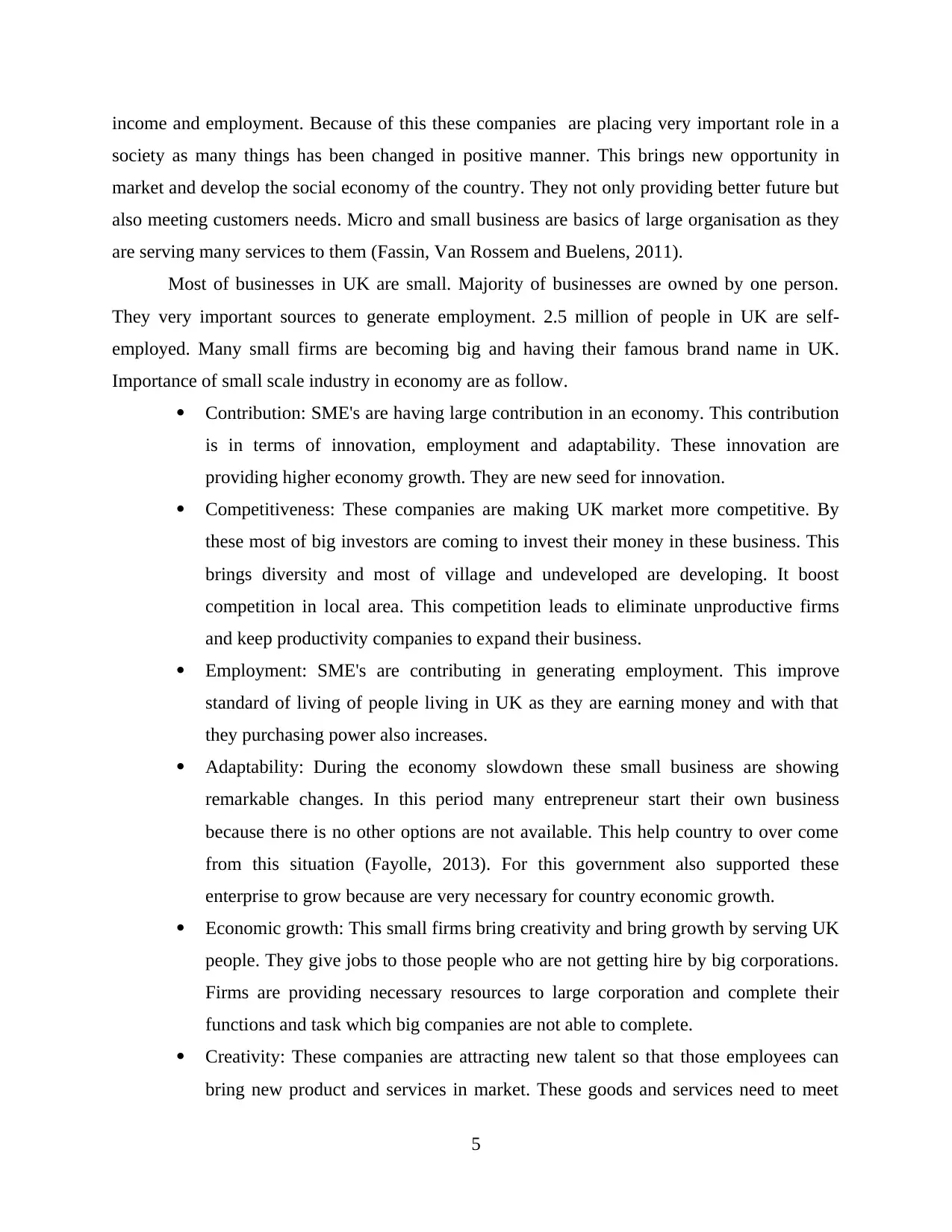
income and employment. Because of this these companies are placing very important role in a
society as many things has been changed in positive manner. This brings new opportunity in
market and develop the social economy of the country. They not only providing better future but
also meeting customers needs. Micro and small business are basics of large organisation as they
are serving many services to them (Fassin, Van Rossem and Buelens, 2011).
Most of businesses in UK are small. Majority of businesses are owned by one person.
They very important sources to generate employment. 2.5 million of people in UK are self-
employed. Many small firms are becoming big and having their famous brand name in UK.
Importance of small scale industry in economy are as follow.
Contribution: SME's are having large contribution in an economy. This contribution
is in terms of innovation, employment and adaptability. These innovation are
providing higher economy growth. They are new seed for innovation.
Competitiveness: These companies are making UK market more competitive. By
these most of big investors are coming to invest their money in these business. This
brings diversity and most of village and undeveloped are developing. It boost
competition in local area. This competition leads to eliminate unproductive firms
and keep productivity companies to expand their business.
Employment: SME's are contributing in generating employment. This improve
standard of living of people living in UK as they are earning money and with that
they purchasing power also increases.
Adaptability: During the economy slowdown these small business are showing
remarkable changes. In this period many entrepreneur start their own business
because there is no other options are not available. This help country to over come
from this situation (Fayolle, 2013). For this government also supported these
enterprise to grow because are very necessary for country economic growth.
Economic growth: This small firms bring creativity and bring growth by serving UK
people. They give jobs to those people who are not getting hire by big corporations.
Firms are providing necessary resources to large corporation and complete their
functions and task which big companies are not able to complete.
Creativity: These companies are attracting new talent so that those employees can
bring new product and services in market. These goods and services need to meet
5
society as many things has been changed in positive manner. This brings new opportunity in
market and develop the social economy of the country. They not only providing better future but
also meeting customers needs. Micro and small business are basics of large organisation as they
are serving many services to them (Fassin, Van Rossem and Buelens, 2011).
Most of businesses in UK are small. Majority of businesses are owned by one person.
They very important sources to generate employment. 2.5 million of people in UK are self-
employed. Many small firms are becoming big and having their famous brand name in UK.
Importance of small scale industry in economy are as follow.
Contribution: SME's are having large contribution in an economy. This contribution
is in terms of innovation, employment and adaptability. These innovation are
providing higher economy growth. They are new seed for innovation.
Competitiveness: These companies are making UK market more competitive. By
these most of big investors are coming to invest their money in these business. This
brings diversity and most of village and undeveloped are developing. It boost
competition in local area. This competition leads to eliminate unproductive firms
and keep productivity companies to expand their business.
Employment: SME's are contributing in generating employment. This improve
standard of living of people living in UK as they are earning money and with that
they purchasing power also increases.
Adaptability: During the economy slowdown these small business are showing
remarkable changes. In this period many entrepreneur start their own business
because there is no other options are not available. This help country to over come
from this situation (Fayolle, 2013). For this government also supported these
enterprise to grow because are very necessary for country economic growth.
Economic growth: This small firms bring creativity and bring growth by serving UK
people. They give jobs to those people who are not getting hire by big corporations.
Firms are providing necessary resources to large corporation and complete their
functions and task which big companies are not able to complete.
Creativity: These companies are attracting new talent so that those employees can
bring new product and services in market. These goods and services need to meet
5
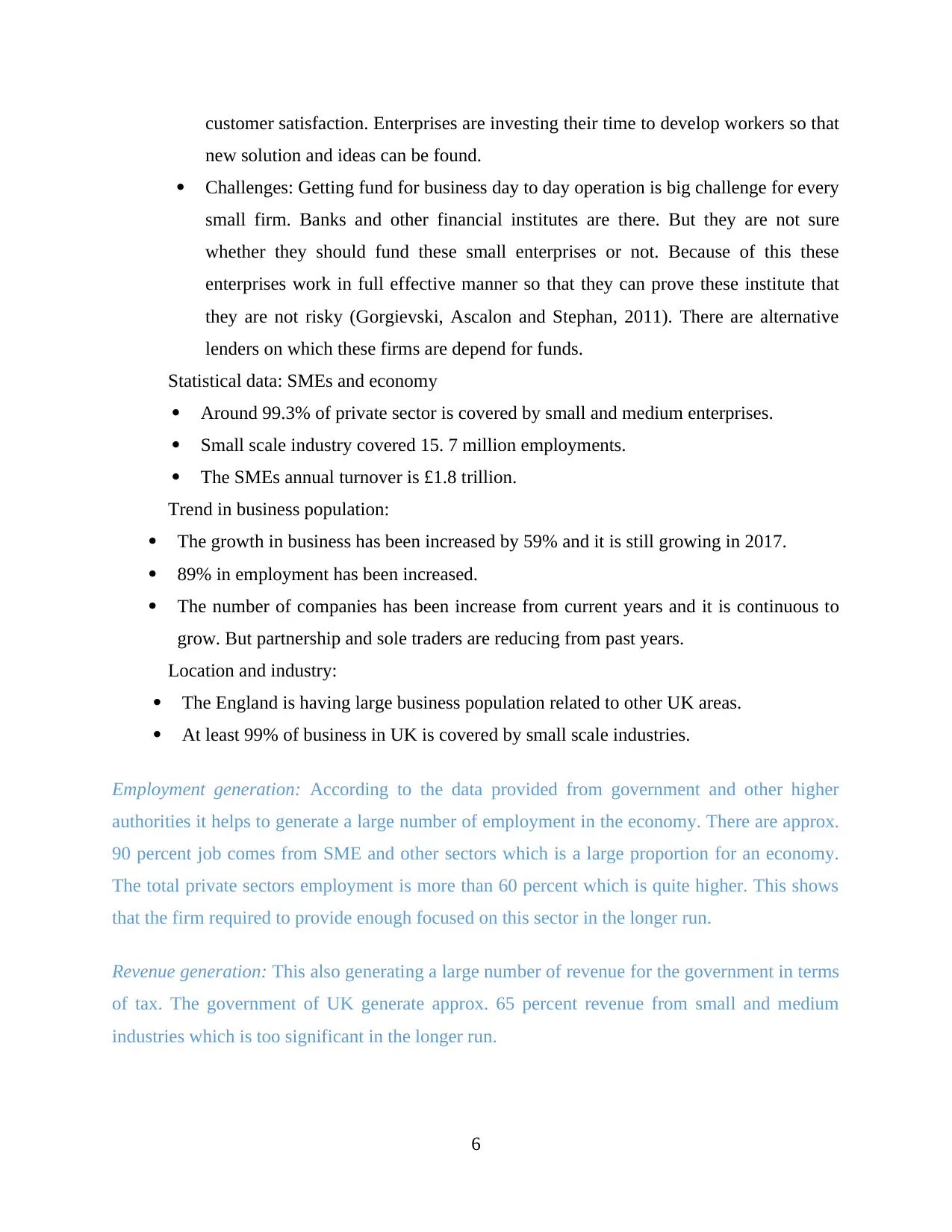
customer satisfaction. Enterprises are investing their time to develop workers so that
new solution and ideas can be found.
Challenges: Getting fund for business day to day operation is big challenge for every
small firm. Banks and other financial institutes are there. But they are not sure
whether they should fund these small enterprises or not. Because of this these
enterprises work in full effective manner so that they can prove these institute that
they are not risky (Gorgievski, Ascalon and Stephan, 2011). There are alternative
lenders on which these firms are depend for funds.
Statistical data: SMEs and economy
Around 99.3% of private sector is covered by small and medium enterprises.
Small scale industry covered 15. 7 million employments.
The SMEs annual turnover is £1.8 trillion.
Trend in business population:
The growth in business has been increased by 59% and it is still growing in 2017.
89% in employment has been increased.
The number of companies has been increase from current years and it is continuous to
grow. But partnership and sole traders are reducing from past years.
Location and industry:
The England is having large business population related to other UK areas.
At least 99% of business in UK is covered by small scale industries.
Employment generation: According to the data provided from government and other higher
authorities it helps to generate a large number of employment in the economy. There are approx.
90 percent job comes from SME and other sectors which is a large proportion for an economy.
The total private sectors employment is more than 60 percent which is quite higher. This shows
that the firm required to provide enough focused on this sector in the longer run.
Revenue generation: This also generating a large number of revenue for the government in terms
of tax. The government of UK generate approx. 65 percent revenue from small and medium
industries which is too significant in the longer run.
6
new solution and ideas can be found.
Challenges: Getting fund for business day to day operation is big challenge for every
small firm. Banks and other financial institutes are there. But they are not sure
whether they should fund these small enterprises or not. Because of this these
enterprises work in full effective manner so that they can prove these institute that
they are not risky (Gorgievski, Ascalon and Stephan, 2011). There are alternative
lenders on which these firms are depend for funds.
Statistical data: SMEs and economy
Around 99.3% of private sector is covered by small and medium enterprises.
Small scale industry covered 15. 7 million employments.
The SMEs annual turnover is £1.8 trillion.
Trend in business population:
The growth in business has been increased by 59% and it is still growing in 2017.
89% in employment has been increased.
The number of companies has been increase from current years and it is continuous to
grow. But partnership and sole traders are reducing from past years.
Location and industry:
The England is having large business population related to other UK areas.
At least 99% of business in UK is covered by small scale industries.
Employment generation: According to the data provided from government and other higher
authorities it helps to generate a large number of employment in the economy. There are approx.
90 percent job comes from SME and other sectors which is a large proportion for an economy.
The total private sectors employment is more than 60 percent which is quite higher. This shows
that the firm required to provide enough focused on this sector in the longer run.
Revenue generation: This also generating a large number of revenue for the government in terms
of tax. The government of UK generate approx. 65 percent revenue from small and medium
industries which is too significant in the longer run.
6
⊘ This is a preview!⊘
Do you want full access?
Subscribe today to unlock all pages.

Trusted by 1+ million students worldwide
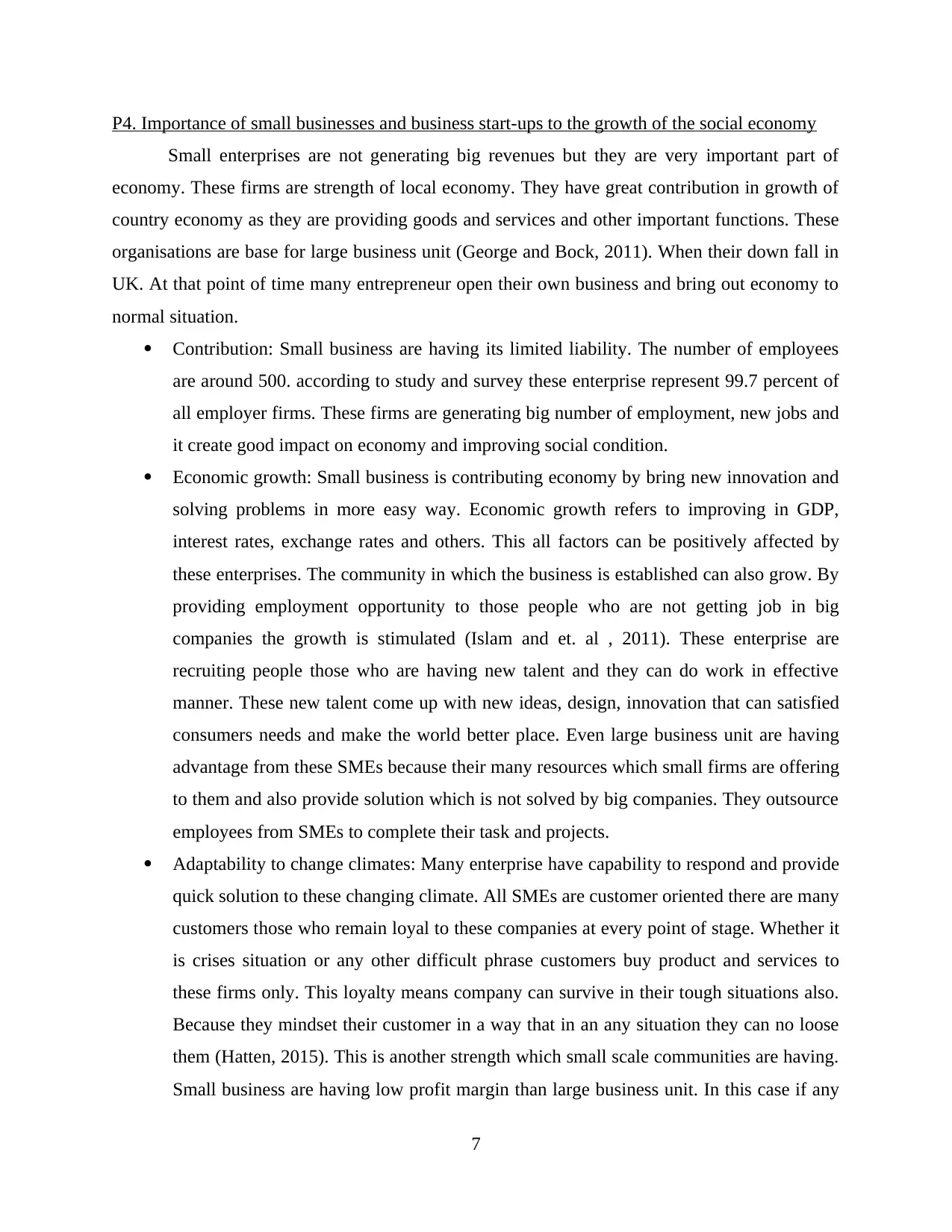
P4. Importance of small businesses and business start-ups to the growth of the social economy
Small enterprises are not generating big revenues but they are very important part of
economy. These firms are strength of local economy. They have great contribution in growth of
country economy as they are providing goods and services and other important functions. These
organisations are base for large business unit (George and Bock, 2011). When their down fall in
UK. At that point of time many entrepreneur open their own business and bring out economy to
normal situation.
Contribution: Small business are having its limited liability. The number of employees
are around 500. according to study and survey these enterprise represent 99.7 percent of
all employer firms. These firms are generating big number of employment, new jobs and
it create good impact on economy and improving social condition.
Economic growth: Small business is contributing economy by bring new innovation and
solving problems in more easy way. Economic growth refers to improving in GDP,
interest rates, exchange rates and others. This all factors can be positively affected by
these enterprises. The community in which the business is established can also grow. By
providing employment opportunity to those people who are not getting job in big
companies the growth is stimulated (Islam and et. al , 2011). These enterprise are
recruiting people those who are having new talent and they can do work in effective
manner. These new talent come up with new ideas, design, innovation that can satisfied
consumers needs and make the world better place. Even large business unit are having
advantage from these SMEs because their many resources which small firms are offering
to them and also provide solution which is not solved by big companies. They outsource
employees from SMEs to complete their task and projects.
Adaptability to change climates: Many enterprise have capability to respond and provide
quick solution to these changing climate. All SMEs are customer oriented there are many
customers those who remain loyal to these companies at every point of stage. Whether it
is crises situation or any other difficult phrase customers buy product and services to
these firms only. This loyalty means company can survive in their tough situations also.
Because they mindset their customer in a way that in an any situation they can no loose
them (Hatten, 2015). This is another strength which small scale communities are having.
Small business are having low profit margin than large business unit. In this case if any
7
Small enterprises are not generating big revenues but they are very important part of
economy. These firms are strength of local economy. They have great contribution in growth of
country economy as they are providing goods and services and other important functions. These
organisations are base for large business unit (George and Bock, 2011). When their down fall in
UK. At that point of time many entrepreneur open their own business and bring out economy to
normal situation.
Contribution: Small business are having its limited liability. The number of employees
are around 500. according to study and survey these enterprise represent 99.7 percent of
all employer firms. These firms are generating big number of employment, new jobs and
it create good impact on economy and improving social condition.
Economic growth: Small business is contributing economy by bring new innovation and
solving problems in more easy way. Economic growth refers to improving in GDP,
interest rates, exchange rates and others. This all factors can be positively affected by
these enterprises. The community in which the business is established can also grow. By
providing employment opportunity to those people who are not getting job in big
companies the growth is stimulated (Islam and et. al , 2011). These enterprise are
recruiting people those who are having new talent and they can do work in effective
manner. These new talent come up with new ideas, design, innovation that can satisfied
consumers needs and make the world better place. Even large business unit are having
advantage from these SMEs because their many resources which small firms are offering
to them and also provide solution which is not solved by big companies. They outsource
employees from SMEs to complete their task and projects.
Adaptability to change climates: Many enterprise have capability to respond and provide
quick solution to these changing climate. All SMEs are customer oriented there are many
customers those who remain loyal to these companies at every point of stage. Whether it
is crises situation or any other difficult phrase customers buy product and services to
these firms only. This loyalty means company can survive in their tough situations also.
Because they mindset their customer in a way that in an any situation they can no loose
them (Hatten, 2015). This is another strength which small scale communities are having.
Small business are having low profit margin than large business unit. In this case if any
7
Paraphrase This Document
Need a fresh take? Get an instant paraphrase of this document with our AI Paraphraser
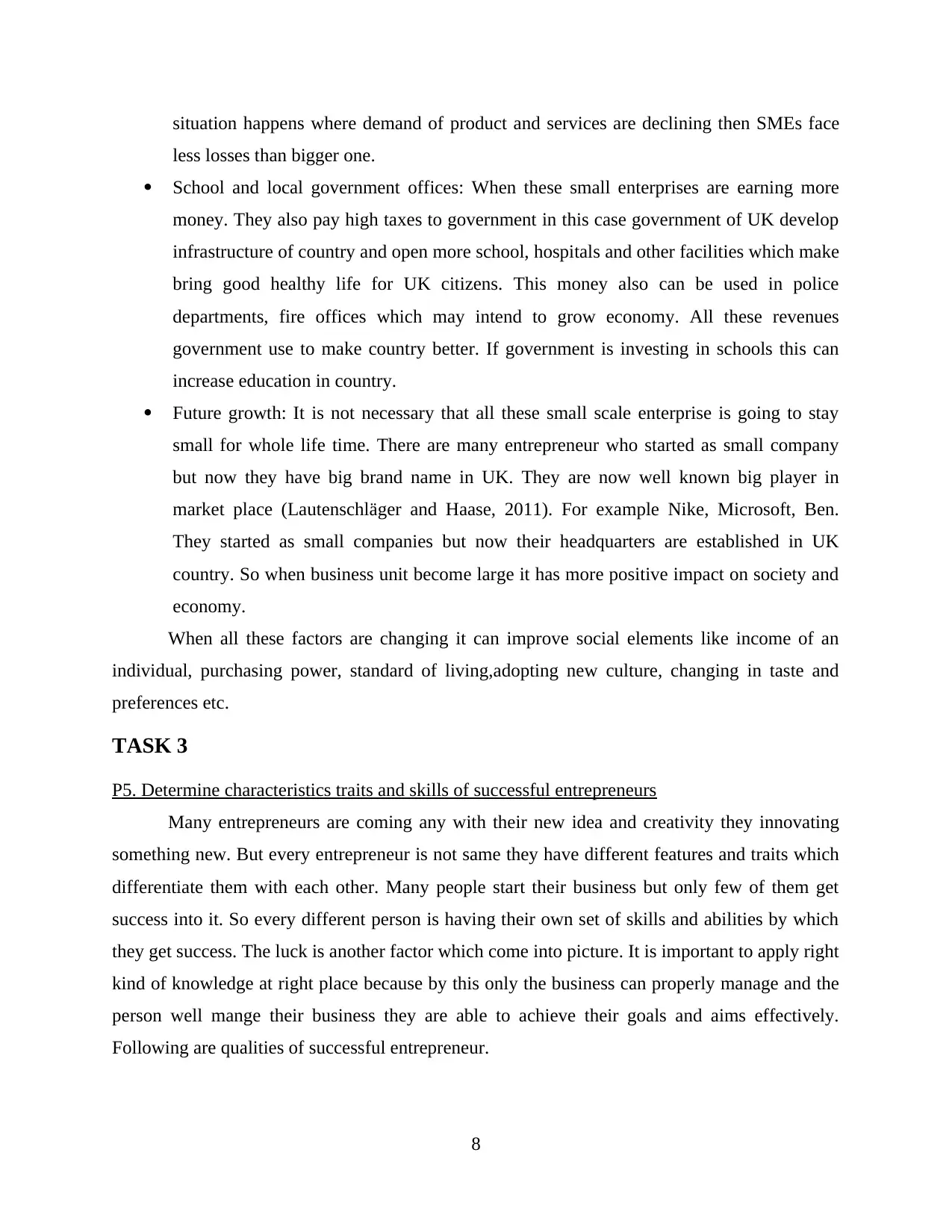
situation happens where demand of product and services are declining then SMEs face
less losses than bigger one.
School and local government offices: When these small enterprises are earning more
money. They also pay high taxes to government in this case government of UK develop
infrastructure of country and open more school, hospitals and other facilities which make
bring good healthy life for UK citizens. This money also can be used in police
departments, fire offices which may intend to grow economy. All these revenues
government use to make country better. If government is investing in schools this can
increase education in country.
Future growth: It is not necessary that all these small scale enterprise is going to stay
small for whole life time. There are many entrepreneur who started as small company
but now they have big brand name in UK. They are now well known big player in
market place (Lautenschläger and Haase, 2011). For example Nike, Microsoft, Ben.
They started as small companies but now their headquarters are established in UK
country. So when business unit become large it has more positive impact on society and
economy.
When all these factors are changing it can improve social elements like income of an
individual, purchasing power, standard of living,adopting new culture, changing in taste and
preferences etc.
TASK 3
P5. Determine characteristics traits and skills of successful entrepreneurs
Many entrepreneurs are coming any with their new idea and creativity they innovating
something new. But every entrepreneur is not same they have different features and traits which
differentiate them with each other. Many people start their business but only few of them get
success into it. So every different person is having their own set of skills and abilities by which
they get success. The luck is another factor which come into picture. It is important to apply right
kind of knowledge at right place because by this only the business can properly manage and the
person well mange their business they are able to achieve their goals and aims effectively.
Following are qualities of successful entrepreneur.
8
less losses than bigger one.
School and local government offices: When these small enterprises are earning more
money. They also pay high taxes to government in this case government of UK develop
infrastructure of country and open more school, hospitals and other facilities which make
bring good healthy life for UK citizens. This money also can be used in police
departments, fire offices which may intend to grow economy. All these revenues
government use to make country better. If government is investing in schools this can
increase education in country.
Future growth: It is not necessary that all these small scale enterprise is going to stay
small for whole life time. There are many entrepreneur who started as small company
but now they have big brand name in UK. They are now well known big player in
market place (Lautenschläger and Haase, 2011). For example Nike, Microsoft, Ben.
They started as small companies but now their headquarters are established in UK
country. So when business unit become large it has more positive impact on society and
economy.
When all these factors are changing it can improve social elements like income of an
individual, purchasing power, standard of living,adopting new culture, changing in taste and
preferences etc.
TASK 3
P5. Determine characteristics traits and skills of successful entrepreneurs
Many entrepreneurs are coming any with their new idea and creativity they innovating
something new. But every entrepreneur is not same they have different features and traits which
differentiate them with each other. Many people start their business but only few of them get
success into it. So every different person is having their own set of skills and abilities by which
they get success. The luck is another factor which come into picture. It is important to apply right
kind of knowledge at right place because by this only the business can properly manage and the
person well mange their business they are able to achieve their goals and aims effectively.
Following are qualities of successful entrepreneur.
8
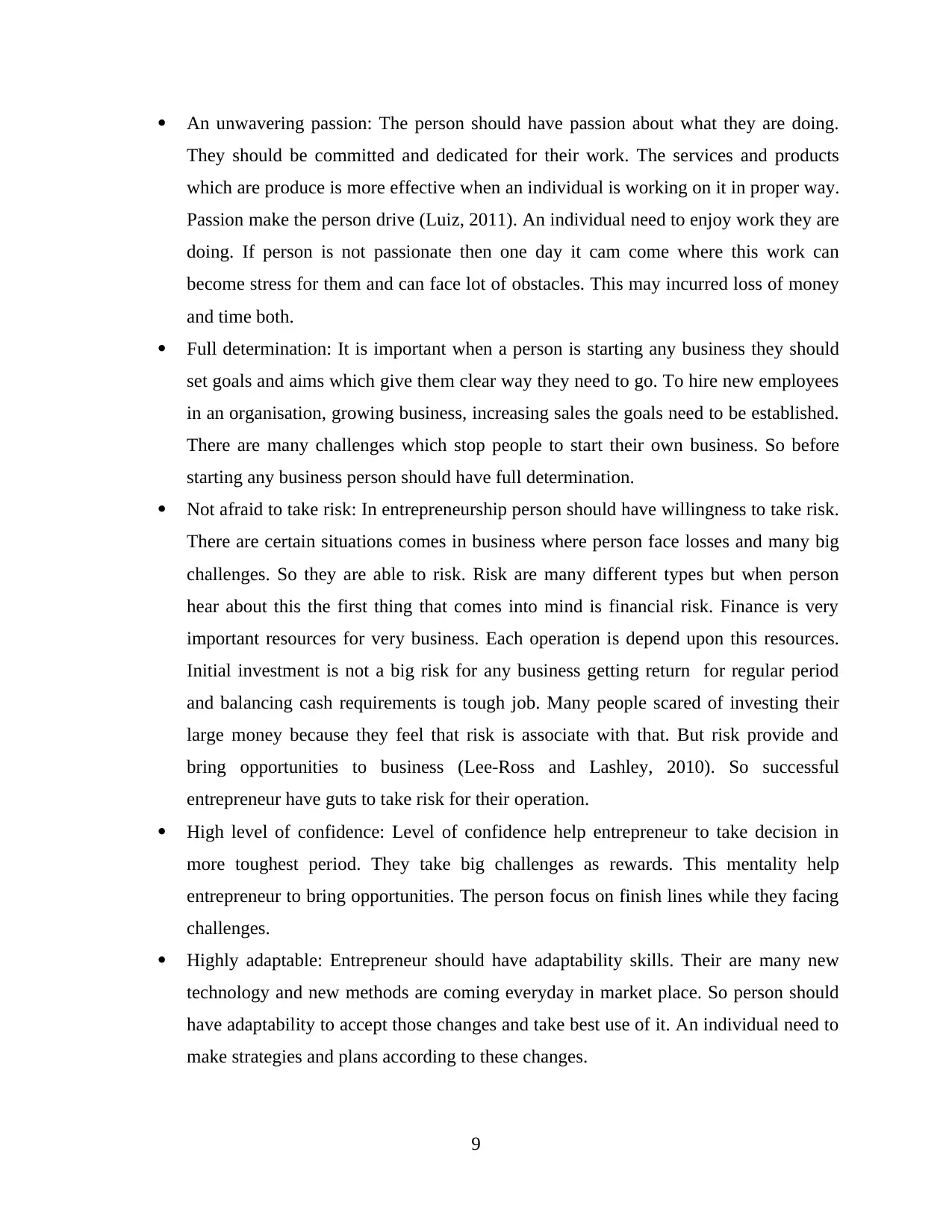
An unwavering passion: The person should have passion about what they are doing.
They should be committed and dedicated for their work. The services and products
which are produce is more effective when an individual is working on it in proper way.
Passion make the person drive (Luiz, 2011). An individual need to enjoy work they are
doing. If person is not passionate then one day it cam come where this work can
become stress for them and can face lot of obstacles. This may incurred loss of money
and time both.
Full determination: It is important when a person is starting any business they should
set goals and aims which give them clear way they need to go. To hire new employees
in an organisation, growing business, increasing sales the goals need to be established.
There are many challenges which stop people to start their own business. So before
starting any business person should have full determination.
Not afraid to take risk: In entrepreneurship person should have willingness to take risk.
There are certain situations comes in business where person face losses and many big
challenges. So they are able to risk. Risk are many different types but when person
hear about this the first thing that comes into mind is financial risk. Finance is very
important resources for very business. Each operation is depend upon this resources.
Initial investment is not a big risk for any business getting return for regular period
and balancing cash requirements is tough job. Many people scared of investing their
large money because they feel that risk is associate with that. But risk provide and
bring opportunities to business (Lee-Ross and Lashley, 2010). So successful
entrepreneur have guts to take risk for their operation.
High level of confidence: Level of confidence help entrepreneur to take decision in
more toughest period. They take big challenges as rewards. This mentality help
entrepreneur to bring opportunities. The person focus on finish lines while they facing
challenges.
Highly adaptable: Entrepreneur should have adaptability skills. Their are many new
technology and new methods are coming everyday in market place. So person should
have adaptability to accept those changes and take best use of it. An individual need to
make strategies and plans according to these changes.
9
They should be committed and dedicated for their work. The services and products
which are produce is more effective when an individual is working on it in proper way.
Passion make the person drive (Luiz, 2011). An individual need to enjoy work they are
doing. If person is not passionate then one day it cam come where this work can
become stress for them and can face lot of obstacles. This may incurred loss of money
and time both.
Full determination: It is important when a person is starting any business they should
set goals and aims which give them clear way they need to go. To hire new employees
in an organisation, growing business, increasing sales the goals need to be established.
There are many challenges which stop people to start their own business. So before
starting any business person should have full determination.
Not afraid to take risk: In entrepreneurship person should have willingness to take risk.
There are certain situations comes in business where person face losses and many big
challenges. So they are able to risk. Risk are many different types but when person
hear about this the first thing that comes into mind is financial risk. Finance is very
important resources for very business. Each operation is depend upon this resources.
Initial investment is not a big risk for any business getting return for regular period
and balancing cash requirements is tough job. Many people scared of investing their
large money because they feel that risk is associate with that. But risk provide and
bring opportunities to business (Lee-Ross and Lashley, 2010). So successful
entrepreneur have guts to take risk for their operation.
High level of confidence: Level of confidence help entrepreneur to take decision in
more toughest period. They take big challenges as rewards. This mentality help
entrepreneur to bring opportunities. The person focus on finish lines while they facing
challenges.
Highly adaptable: Entrepreneur should have adaptability skills. Their are many new
technology and new methods are coming everyday in market place. So person should
have adaptability to accept those changes and take best use of it. An individual need to
make strategies and plans according to these changes.
9
⊘ This is a preview!⊘
Do you want full access?
Subscribe today to unlock all pages.

Trusted by 1+ million students worldwide
1 out of 18
Related Documents
Your All-in-One AI-Powered Toolkit for Academic Success.
+13062052269
info@desklib.com
Available 24*7 on WhatsApp / Email
![[object Object]](/_next/static/media/star-bottom.7253800d.svg)
Unlock your academic potential
Copyright © 2020–2026 A2Z Services. All Rights Reserved. Developed and managed by ZUCOL.




